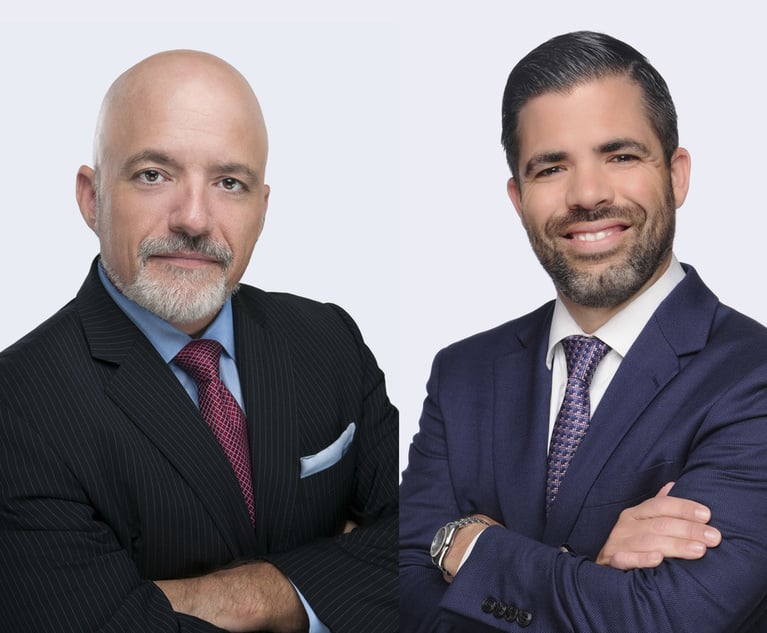Defense Counsel Should Include Public Relations as Part of Their Strategy
Time was, if a local or national company was sued, news of the lawsuit—assuming it even made the news—was largely confined to the city or town where the suit was filed.
November 26, 2018 at 09:55 AM
4 minute read
 Paul Abercrombie principal Abercrombie Communications, Inc. (Photo: Courtesy photo)
Paul Abercrombie principal Abercrombie Communications, Inc. (Photo: Courtesy photo)
Time was, if a local or national company was sued, news of the lawsuit—assuming it even made the news—was largely confined to the city or town where the suit was filed.
But the internet changed all that. Now, even frivolous suits can mar a company's reputation around the globe in a matter of hours. Social media can echo and amplify these effects many times over.
Indeed, social media attention to a case can even spark coverage by traditional media.
Plaintiffs lawyers, long mindful that publicity can be among the most potent weapons in convincing a defendant to settle a case, often use public relations to try a case in public well before it gets to a courtroom.
Cases are ultimately decided in the courtroom or at the settlement table. But judges, jurors and members of the public often decide how to view a case from media coverage. What's more, negative publicity can tarnish a defendant's reputation for years to come, regardless of the outcome of the case.
Which is why it's more important than ever for defense counsel to include public relations as part of their strategy; it's no longer enough to wait until the client is vindicated in court.
As someone who has helped both plaintiffs and defense lawyers with public relations strategies, I acknowledge that I benefit from this trend. But I believe defense attorneys may find themselves at a disadvantage by not including public relations as part of their legal strategies.
Plaintiffs may benefit by filing lawsuits at the same time that they reach out to the media—all that may take place before the defendant has even been served. As a result, defense attorneys and their clients can be unprepared when reporters call, or even knock on the door.
That being said, there are ways that the defense can mitigate negative media coverage from lawsuits.
Companies should always have a plan for managing crises such as natural disasters or sexual harassment claims. In the same spirit, businesses should be ready for lawsuits and the resulting negative publicity. Most companies will be sued; it's simply an unfortunate part of doing business.
Sometimes companies can see a lawsuit coming, other times, a suit may come out of the blue. Either way, having a plan in place can give a business a head start in responding.
Here are some PR tips for defendants and their lawyers:
- Have a basic plan in place so you can refer to it when you are sued. This typically involves one or more company leaders huddling with defense counsel to hammer out strategic details. Will the company CEO talk to the media, or should it be the company lawyer? What will be the media's most likely questions?
- Return every media call, even if your attorney's advice is to not answer questions. If you can't talk to reporters, call them back and tell them that. You may want to say something like, “We're very eager to explain why the plaintiff's claims are baseless. But we believe it's fair and ethical only to do so in front of a judge and jury.”
- If you learn of the lawsuit from a reporter, promise to get back in touch before the reporter's deadline. This will buy you time to strategize with your defense counsel.
- Because litigation may unfold over weeks, months or even years, you'll likely have multiple interactions with media interested in fresh developments in your lawsuit. You may want to anticipate these, and reach out to media to help them tell your story. If initial media coverage seemed unfair, here is your chance to shape coverage that is more favorable.
- If you determine that fair coverage from a reporter or outlet is unlikely, approach other media. For example, a local business publication may be more sympathetic to your company's position.
- If you prevail in your case, let the media know. But don't gloat, and don't trash the plaintiff.
Once the suit is resolved, it's time for a review of your performance. Did you respond in media interviews in ways that benefited your company, and mitigated the negatives effects of the lawsuit? Or did you find yourself wishing you had taken a different tack? Taking a fearless look at your performance after the fact may help you deal with the next lawsuit's media coverage.
Paul Abercrombie is a publicist and writer with Abercrombie Communications Inc. in Tampa. Contact him at [email protected]
This content has been archived. It is available through our partners, LexisNexis® and Bloomberg Law.
To view this content, please continue to their sites.
Not a Lexis Subscriber?
Subscribe Now
Not a Bloomberg Law Subscriber?
Subscribe Now
NOT FOR REPRINT
© 2025 ALM Global, LLC, All Rights Reserved. Request academic re-use from www.copyright.com. All other uses, submit a request to [email protected]. For more information visit Asset & Logo Licensing.
You Might Like
View All
Trending Issues in Florida Construction Law That Attorneys Need to Be Aware Of
6 minute read


Trending Stories
Who Got The Work
J. Brugh Lower of Gibbons has entered an appearance for industrial equipment supplier Devco Corporation in a pending trademark infringement lawsuit. The suit, accusing the defendant of selling knock-off Graco products, was filed Dec. 18 in New Jersey District Court by Rivkin Radler on behalf of Graco Inc. and Graco Minnesota. The case, assigned to U.S. District Judge Zahid N. Quraishi, is 3:24-cv-11294, Graco Inc. et al v. Devco Corporation.
Who Got The Work
Rebecca Maller-Stein and Kent A. Yalowitz of Arnold & Porter Kaye Scholer have entered their appearances for Hanaco Venture Capital and its executives, Lior Prosor and David Frankel, in a pending securities lawsuit. The action, filed on Dec. 24 in New York Southern District Court by Zell, Aron & Co. on behalf of Goldeneye Advisors, accuses the defendants of negligently and fraudulently managing the plaintiff's $1 million investment. The case, assigned to U.S. District Judge Vernon S. Broderick, is 1:24-cv-09918, Goldeneye Advisors, LLC v. Hanaco Venture Capital, Ltd. et al.
Who Got The Work
Attorneys from A&O Shearman has stepped in as defense counsel for Toronto-Dominion Bank and other defendants in a pending securities class action. The suit, filed Dec. 11 in New York Southern District Court by Bleichmar Fonti & Auld, accuses the defendants of concealing the bank's 'pervasive' deficiencies in regards to its compliance with the Bank Secrecy Act and the quality of its anti-money laundering controls. The case, assigned to U.S. District Judge Arun Subramanian, is 1:24-cv-09445, Gonzalez v. The Toronto-Dominion Bank et al.
Who Got The Work
Crown Castle International, a Pennsylvania company providing shared communications infrastructure, has turned to Luke D. Wolf of Gordon Rees Scully Mansukhani to fend off a pending breach-of-contract lawsuit. The court action, filed Nov. 25 in Michigan Eastern District Court by Hooper Hathaway PC on behalf of The Town Residences LLC, accuses Crown Castle of failing to transfer approximately $30,000 in utility payments from T-Mobile in breach of a roof-top lease and assignment agreement. The case, assigned to U.S. District Judge Susan K. Declercq, is 2:24-cv-13131, The Town Residences LLC v. T-Mobile US, Inc. et al.
Who Got The Work
Wilfred P. Coronato and Daniel M. Schwartz of McCarter & English have stepped in as defense counsel to Electrolux Home Products Inc. in a pending product liability lawsuit. The court action, filed Nov. 26 in New York Eastern District Court by Poulos Lopiccolo PC and Nagel Rice LLP on behalf of David Stern, alleges that the defendant's refrigerators’ drawers and shelving repeatedly break and fall apart within months after purchase. The case, assigned to U.S. District Judge Joan M. Azrack, is 2:24-cv-08204, Stern v. Electrolux Home Products, Inc.
Featured Firms
Law Offices of Gary Martin Hays & Associates, P.C.
(470) 294-1674
Law Offices of Mark E. Salomone
(857) 444-6468
Smith & Hassler
(713) 739-1250






